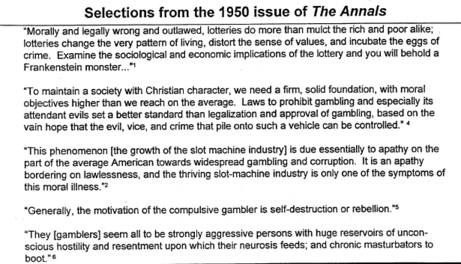The WAGER, Vol. 3 (42) – Time capsule
In March of this year, the American Academy of Political and Social Science devoted an entire issue of its
journal, The Annals, to the study of gambling. That an established scholarly outlet would allocate 196 pages to gambling suggests that the field of gambling studies at last has established a niche in the spectrum of academic discourse. But the field is hardly nascent; in fact, the March special issue was the third The Annals had devoted to gambling. The first, published in May of 1950, provides a unique opportunity to learn how the post-war academic community viewed gambling. Of course, the social and political climate that produced the quotes below, is far different from the one in which the March 1998 issue was produced. In 1950, state lotteries did not exist (1), some pinball machines were still considered to be gaming devices (2), a U.S. Senator called for a national inquiry into the relationship between gambling and racketeering, and the mayor of New York City proposed the legalization of regulated sports betting (3). With this historical context in mind, critical reading can help us meditate on just how far the study of gambling has come over the past 48 years. Whereas the journal of 1950 does little to mask its anti-gambling stance, the journal of today represents a more tempered discourse. Was it the events of the past half century that prompted this change in presentation, or does this change of tone merely mirror the proliferation of gambling? We may have to wait for the next gambling-related issue of The Annals to obtain an answer.
Sources: All articles appear in The Annals of the American Academy of Political and Social Science, 269 (May, 1950).
- Blanche, E.E., “Lotteries yesterday, today and tomorrow.”
- Anonymous, “Slot machines and pinball games.”
- Ploscowe, M., and Lukas, E.J. “Foreward.”
- Deland, P.S. The Facilitation of Gambling.”
- Morehead, A.H. “The professional gambler.”
- Lindner, R.M. “The psychodynamics of gambling.”
